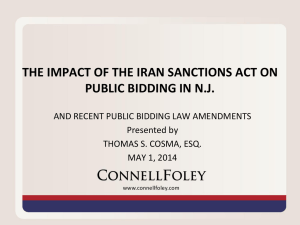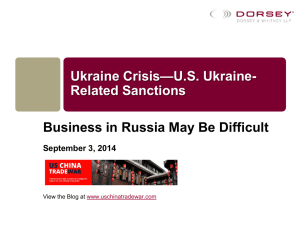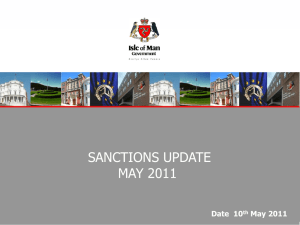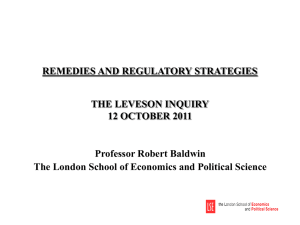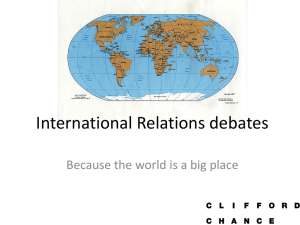US Persons
advertisement
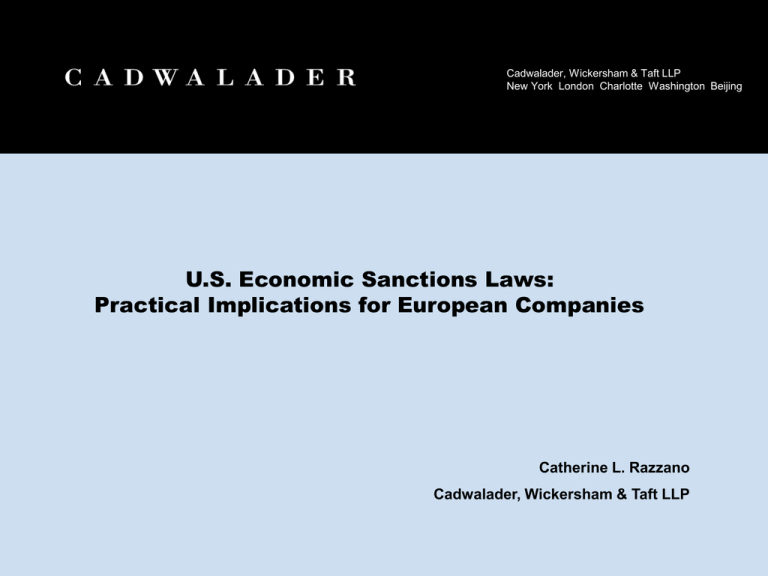
Cadwalader, Wickersham & Taft LLP New York London Charlotte Washington Beijing U.S. Economic Sanctions Laws: Practical Implications for European Companies Catherine L. Razzano Cadwalader, Wickersham & Taft LLP Introduction • Overview of U.S. Economic Sanctions Laws • Economic Sanctions Programs Under U.S. Law • Practical Implications of Economic Sanctions Laws • Recent Enforcement Actions • The Importance of Compliance Policies and Procedures • The Changing Landscape of Economic Sanctions Laws Cadwalader, Wickersham & Taft LLP 2 Overview of U.S. Economic Sanctions • The United States uses economic sanctions as a tool to respond to various threats to its national security. • The President of the United States is granted the ability to impose economic sanctions under two laws in the United States: – International Emergency Economic Powers Act (“IEEPA”) • The President may declare threats to the national security, foreign policy or economy of the U.S. • In response to such threats, the President may block certain transactions or freeze assets. – Trading with the Enemy Act (“TWEA”) • During times of war, the President may oversee or restrict any and all trade between the U.S. and its enemies. Cadwalader, Wickersham & Taft LLP 3 Enforcement • U.S. economic sanctions programs are enforced by the U.S. Department of the Treasury’s Office of Foreign Asset Controls (“OFAC”), which promulgates regulations pursuant to IEEPA and TWEA. • The OFAC website provides a wealth of information on U.S. economic sanctions programs and is an excellent resource for additional information on specific sanctions programs. See http://www.treas.gov/offices/enforcement/ofac/. Cadwalader, Wickersham & Taft LLP 4 Current U.S. Economic Sanctions Programs • Two Categories of Sanctions: – Program-based sanctions – User-based sanctions • Specially Designated National (“SDN”) – The U.S. publishes a list of individuals, companies, financial institutions and vessels that are: • owned or controlled by targeted countries, or • that are designated under other programs. – The SDN List can be found at: http://www.ustreas.gov/offices/enforcemen t/ofac/sdn/t11sdn.pdf – The SDN List is updated frequently, so you must check often. Other countries, including Germany, also maintain such lists. Program-Based User-Based Burma (Myanmar) Cuba Iran North Korea Sudan Syria Counter Narcotics Trafficking Sanctions Non-Proliferation Sanctions Diamond Trading Sanctions Counter Terrorism Sanctions Balkans Belarus Cote d’Ivoire Democratic Republic of the Congo Iraq Former Liberian Regime of Charles Taylor Lebanon Somalia Zimbabwe Cadwalader, Wickersham & Taft LLP 5 Practical Implication of Sanctions – Jurisdiction • U.S. economic sanctions programs promulgated under IEEPA apply to “U.S. Persons”, which includes the following: – U.S. citizens and permanent resident aliens of the United States, wherever located; – persons within the United States; regardless of nationality; and – entities organized under the laws of the United States or of any state, territory, possession of the United States, including foreign branches (all of the foregoing hereinafter referred to as “U.S. Persons”) • Sanctions programs promulgated under TWEA (North Korea and Cuba) apply to a “Person Subject to the Jurisdiction of the U.S.” which includes: – All of the categories listed above; AND – Any entity, wherever organized or doing business, that is owned or controlled by U.S. citizens, permanent residents of the U.S. or entities organized under the laws of the U.S. Cadwalader, Wickersham & Taft LLP 6 Practical Implication of Sanctions – Jurisdiction • U.S. economic sanctions can impact European companies. • Despite the fact that a wholly-owned and incorporated European company may, under U.S. law, legally conduct business with sanctioned countries, the following factors can result in the company being subject to jurisdiction in the U.S.: – The company’s senior management is comprised of U.S. Persons. – The company’s senior management is based in the United States and essentially runs the company from there. – There are U.S. Persons working within the business that have dealings with sanctioned countries and have not properly recused themselves. – Foreign persons use the mail or wires to communicate with a U.S. Person regarding a dealing or transaction with a sanctioned country. Cadwalader, Wickersham & Taft LLP 7 Practical Implications of Sanctions Facilitation • No U.S. Person or Person Subject to the Jurisdiction of the United States may approve, finance, facilitate or guarantee any transaction by a foreign person where the transaction by that foreign person would be prohibited if performed by a U.S. Person. • Facilitation may include: – Altering operating policies or procedures to permit a foreign subsidiary to do the business; – Referring to a foreign person purchase orders, requests for bids, or similar business opportunities to which a U.S. Person could not directly respond; – Changing or creating operating policies or procedures of a particular affiliate with the specific purpose of facilitating transactions that would otherwise be prohibited; and – Using or authorizing use of freight forwarders, shipping agents or vessels, i.e., Islamic Republic of Iran Shipping Lines (“IRISL”), owned or operated by an Iranian. Cadwalader, Wickersham & Taft LLP 8 Recent Enforcement Actions • Credit Suisse – December 2009 – OFAC, the Department of Justice and the New York District Attorney’s Office settled with Credit Suisse for a combined total of $536 million. • This is the largest penalty in OFAC’s history. – Credit Suisse processed thousands of transactions with intent to purposely conceal the involvement of the following sanctioned parties: • Iran (the majority of the conduct was related to Iran); and • Sudan, Libya, Burma, Cuba and the former Liberian regime of Charles Taylor. – OFAC described Credit Suisse’s actions as “egregious” because of the following factors: • Substantial economic benefit to sanctioned parties; • The scope and severity of the conduct; and • Awareness of the conduct within the bank. Cadwalader, Wickersham & Taft LLP 9 Recent Enforcement Actions • Schneider Gmbh – February 2009 – Schneider, a German company, and its two directors, both German nationals, were indicted for conspiracy to violate IEEPA and the Iranian Transactions Regulations. – Despite the fact that none of the parties were U.S. Persons, 31 C.F.R. § 560.205(a)(1) prohibits: • “the reexportation from a third country, directly or indirectly, by a person other than a United States person, of any goods, technology or services that have been exported from the United States . . . if: (1) Undertaken with knowledge or reason to know that the reexportation is intended specifically for Iran or the Government of Iran” – The two German nationals used e-mail, mail, telephone calls and faxes to contact U.S. companies to order pumps and pump parts, which Schneider maintained were destined for use in Germany (and later indicated the pumps would be re-exported to Jordan). – The true destination of the pumps was concealed and they were imported from the U.S. to Germany for the purpose of being re-exported to Iran, in violation of the Iranian Transactions Regulations. Cadwalader, Wickersham & Taft LLP 10 Compliance Policies and Procedures • Compliance policies and procedures are critical to ensuring compliance with U.S. economic sanctions laws. • Specifically, companies should consider: – Recusal • Companies should implement procedures for U.S. Persons and Persons Subject to the Jurisdiction of the United States to formally recuse themselves from the following: – Receiving, initiating or forwarding any correspondence, documents or other materials related to business with a sanctioned country; – Attending meetings where there are discussions related to business in sanctioned countries; and – Participating in any conversations or telephone calls where business with sanctioned countries is discussed. – Recusal Forms should be made available to all U.S. Persons and Persons Subject to the Jurisdiction of the U.S. Cadwalader, Wickersham & Taft LLP 11 Compliance Policies and Procedures – U.S. Persons and Persons Subject to the Jurisdiction of the U.S. may not refer any matters or business opportunities related to a sanctioned country to non-U.S. persons. • All employees should receive training on how to properly respond to any such inquiries. – Non-U.S. Persons should not: • Provide or forward any correspondence, documents or other materials related to business with a sanctioned country to a U.S. Person; • Refer any matters or opportunities related to a sanctioned country to a U.S. Person; • Discuss any matters or opportunities with a U.S. Person, in meetings, telephone calls or private conversations; or • Request any assistance from a U.S. Person. Cadwalader, Wickersham & Taft LLP 12 Compliance Policies and Procedures • Due Diligence is essential to ensure that companies know: – Which employees are U.S. Persons or Persons Subject to the Jurisdiction of the United States. – Customers and other third parties are properly screened and vetted before entering into a business relationship. It is the company’s responsibility to ensure they are not doing business with a Specially Designated National or with a company from a sanctioned country. – Companies with a global customer base or extensive network of agents or traders should consider implementing formal or structured due diligence procedures. Cadwalader, Wickersham & Taft LLP 13 The Changing Landscape of U.S. Economic Sanctions • The Obama Administration and the U.S. Congress are pushing for more stringent sanctions against Iran. • Both the U.S. House of Representatives and U.S. Senate have recently passed legislation that would expand the economic sanctions programs against Iran. – The House’s Iran Refined Petroleum Sanctions Act of 2009 and the Senate’s Comprehensive Iran Sanctions, Accountability and Divestment Act of 2009 would: • Specifically target certain sectors in Iran, including the petroleum and energy sectors. • Prohibit selling or otherwise providing goods, services or technology that directly and significantly facilitate the maintenance or expansion of Iran's domestic production of refined petroleum products. • Prohibit providing Iran with refined petroleum products. • The Iran Threat Reduction Act of 2009, which is still in the House, would expand the definition of U.S. Person and apply sanctions retroactively. Cadwalader, Wickersham & Taft LLP 14 The Changing Landscape of U.S. Economic Sanctions • President Obama recently signed an Executive Order declaring that the increased violence in Somalia and frequent piracy and armed robbery off the coast of Somalia constitutes an unusual and extraordinary threat to U.S. national security. – President Obama declared a national emergency in response to the threat and froze the assets of certain individuals and entities involved in the violence and piracy. • As U.S. sanctions programs continue to expand, companies must be aware of those changes and how they can impact their business. Cadwalader, Wickersham & Taft LLP 15 The Changing Landscape of International Economic Sanctions • The international community is stepping up its support of economic sanctions, particularly against Iran. • The EU and the rest of the international community have become increasingly concerned about Iran and North Korea’s nuclear weapons programs. – This is evidenced by the Nuclear Security Summit that occurred in Washington, D.C. two weeks ago, where forty-seven nations met to discuss the threat of nuclear weapons. • The UN and several EU member states have been calling for more stringent sanctions against Iran in response to its continued uranium enrichment activities. • Several multi-national corporations – e.g., Royal Dutch Shell and Siemens AG – are terminating their business in Iran because of reputational harm. • U.S. GAO Report published recently lists large European companies with U.S. ties that are doing business in Iran. Cadwalader, Wickersham & Taft LLP 16 Conclusion • It is important for European companies to be aware of U.S. economic sanctions programs and how those sanctions may impact their business. • Implementing compliance policies and procedures is an important step in ensuring that U.S. economic sanctions laws are not violated, even for those companies that predominately conduct business through a European or other foreign entity. • Finally, companies may want to evaluate the risks involved in conducting business in certain sanctioned countries, such as Iran, as the U.S. and the international community contemplates more extensive sanctions. Cadwalader, Wickersham & Taft LLP 17



